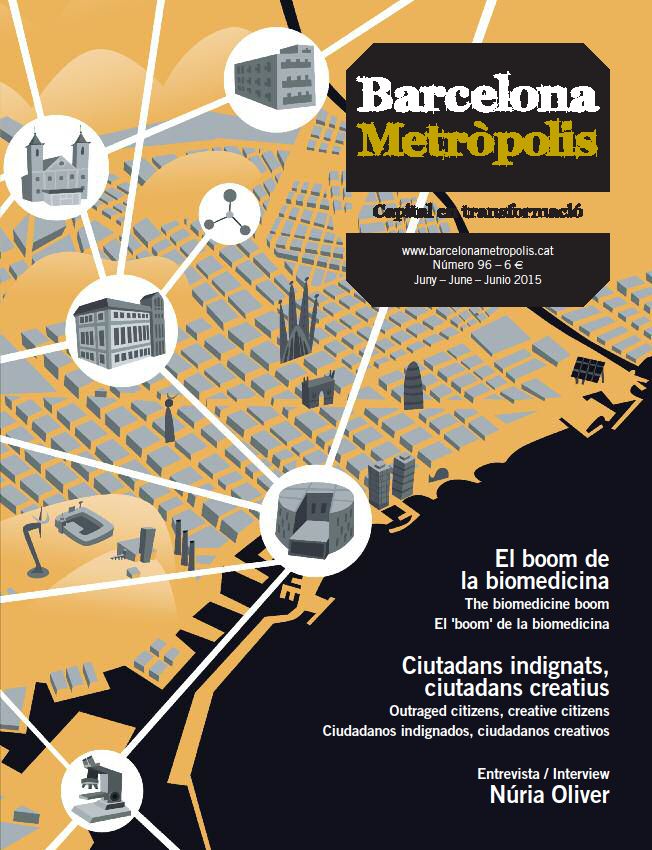The future of the research system in Catalonia requires following through with the good decisions made to date and garnering public support for scientific research.
If you were to ask any Barcelonian to list some of the main features that give the city its identity, few would say research, and even fewer would say biomedical research. However, in recent years Barcelona and its metropolitan area have become a well-known scientific centre, especially in biotechnology, biomedicine and medical technology. So much so that in March of this year a total of fourteen researchers working in Catalonia – including biomedical researchers – received funding in the second call for proposals for Consolidator Grants, which are awarded by the European Research Council (ERC).
The picture described above would have been unimaginable in the 1990s, and it was not until early in the 21st century when an exceptional coming together of ideas and decisions led to the current Catalan research system. This system is one that minimises bureaucracy and is based on finding talent, performance assessment, the independence of its centres, excellence as its byword, and most of all is tied to a country and not a partisan vision. Credit for the design of this structure goes to Andreu Mas-Colell, who, with the support and efforts of many others, successfully gave Catalonia a graft of the pragmatic Anglosphere mindset.
Nevertheless, it has to be borne in mind that the success of this model has never been a guarantee for its survival. Some of its main figures – directors of research institutes – recognise that the system is fragile. Indeed, they do not hesitate to confirm that the system could have been washed away by the crisis. They add that this did not happen because of a clear political will to protect it, and because the professionals that it comprises have been fully committed to it.
In terms of government, the tacit agreement to back science irrespective of the party in power has protected research and allowed it to continue receiving the minimum resources needed to keep centres operational. The idea that research has strategic value has expanded right across the political spectrum.
As for the professionals that comprise the system, it is an unavoidable fact that they have received many offers from abroad. With the heavy recession, those sending offers have had good reason to believe that some researchers could be tempted by more favourable conditions elsewhere. In fact, central government cuts have led to Spain losing 11,000 researchers since 2010, and even if they have not all gone abroad, the figure sends a clear message to the world that right now Spain is a country that does not give a warm welcome to research.
In Catalonia, the opposite was true; there was a definite understanding from the start of the crisis that failure to protect the research system could lead to its collapse. This would have been unthinkable for two reasons: the first was that it had cost a great deal to set it up, and the second was that, despite being young, it was a model that produced results, capable of securing funding from the European Union on its own merits. It is worth remembering that the ERC calls for proposals are judged exclusively on criteria of scientific excellence.
Now that there are signs of economic recovery, it is natural to think about what direction might be taken by a system in which biomedical research is an essential component. Once forthcoming objectives for the system have been established – something that calls for another separate discussion – there is a fundamental question begging a response: what do we need from our society to achieve the milestones we set ourselves? Some may find mention of society surprising, given that the challenges facing the scientific community are little known to most members of the public. However, as highlighted before, Catalan research is a result of a political drive that is a democratic reflection of what the people want.
Public involvement
When this aspect is mentioned to the heads of leading institutions in the system, all of them underscore the fact that greater involvement of the general public is needed. Joan Guinovart, Director of the IRB Barcelona (Institute for Research in Biomedicine), cites the United States as an example of public engagement: in addition to government grants, voluntary funding is provided by many members of the public through sponsorship or donations. Does this attitude reflect a scientific culture that is more widespread? Not necessarily. Emilià Pola, Executive Director of the ICREA (Catalan Institution for Research and Advanced Studies), prefers to connect it with simple recognition of the importance of research for the collective, the belief that it is better to promote research than to fail to do so. A saying that has caught on summarises this view very well: “Countries do not conduct research because they are rich; they are rich because they conduct research.”
The fact that biomedical research has a leading position among other types of research can prompt public awareness. One of the chief enemies of continued investment in science – and in so many other things – is populism. In recent years, voices have been heard drawing comparisons between supposed “real and immediate needs” and efforts made in other fields such as research. These pseudo-arguments are easy to debunk; for example, translational research conducted at hospitals is aimed at solving specific problems that arise on a daily basis. Patients can benefit from it directly. In the case of basic or clinical research – the other types of biomedical research – it is clear that they too end up bringing improvements to the health prospects of many people. Cancer, heart problems and neurodegenerative diseases present real and immediate needs. Despite the strength of this evidence, populist temptation does not cease to be a sword of Damocles, urging caution.
Apart from generating wider public support – an area in which there is a lot of work still to be done – the experts spoken to argue that everything done well so far must be continued: consolidating the institutes that have been founded, maintaining appropriate financing for them, continuous assessment of their work, promoting a certain positive tension between groups to enhance in competitiveness and, last but not least, preserving the centres’ independence without interfering with their judgement. This final point is crucial if excellence is not to be replaced by uniformity and a path to mediocrity.
Interdisciplinary exchanges
The same experts do not believe there will be a significant rise in the number of centres and researchers in coming years. In contrast, they point out that the potential for growth will come from contact between disciplines that currently have nascent relationships, for example between biology and newer fields such as nanomaterials or biomaterials. These exchanges could give rise to surprising advances. Naturally the innate curiosity of the scientific spirit also plays an important part, but nothing should be taken away from the fact that Barcelona has shown itself capable of attracting and retaining a large amount of talent, enhancing the likelihood of productive exchanges.
There are still challenges of different dimensions that must be faced, such as the relationship between research and business, and the definition of the Catalan political framework in which future decisions will be taken. For now we have the right structure, method and climate to one day welcome research as another facet of our collective identity.




